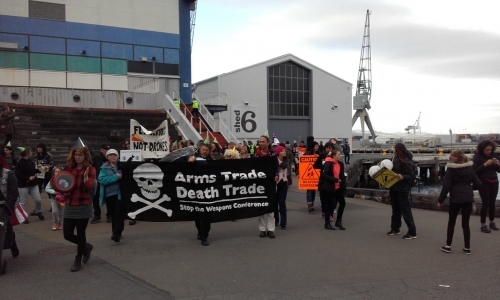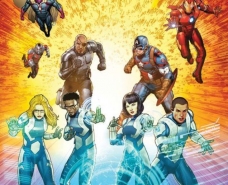Interview with Peace Action Wellington

By Semih Sapmaz
Activists from Peace Action Wellington (PAW) organised two days of nonviolent direct actions against the annual Weapons Conference held in New Zealand (NZ) last November. Following their peaceful protests, 27 activists - 26 of whom keep fighting charges - were arrested and taken to court. On 18 February they are standing trial again, defending their right to peaceful demonstration for peace and justice.
Sending our solidarity messages to the activists in Wellington, we reached Valerie Morse from PAW and asked her about their campaign Stop the Weapons Conference as well as many other questions on militarism and the antimilitarist movement in New Zealand.
To begin with, can you tell us about Peace Action Wellington: when it was formed and what was the motivations behind forming it?
Peace Action Wellington (PAW) was born in the days leading up to the invasion of Iraq in 2002. There had been a very sizeable community response to the bombing of Afghanistan following September 11, 2001, and soon after PAW came together and began meeting regularly. The primary concern of PAW was to oppose any NZ involvement in the War on Terrorism. The group is a grassroots community group comprised of individuals, many of whom “wear other hats” in terms of involvement in other political groups and campaigns.
You organised a number of actions to stop the 2015 Wellington Weapons Conference took place last November? Can you tell us more about the Conference and your campaign Stop the Weapons Conference?
The Weapons Conference is an annual event in Wellington where representatives from over 500 companies get together to develop new markets for weapons and military-related goods and services. Its official name is the New Zealand Defence Industry Association Conference, and it exists to maximise the sales of local companies and create relationships between small New Zealand companies and the “Primes” e.g. the major weapons manufacturers.
Peace Action Wellington has organised against the conference off and on for many years, but the last time we seriously worked on the issue was in 2006.
The group again had capacity to organise against the conference this year. We began by targeting the Mayor of Wellington who is currently the Executive Chairperson for the International Mayors for Peace group. We had hoped that she would be sympathetic to our campaign, however, she was unwilling to meaningfully engage with us. On Hiroshima Day, she said to me that she didn’t see a link between the proliferation of nuclear weapons and the conference. I said that Lockheed Martin, the world’s largest manufacturer of weapons, and a producer of nukes, sponsored the conference. She still refused to endorse the campaign.
We got out on the streets every week in the 4 months leading up to the conference to engage with people in Wellington. Most people had no idea that such a conference was held here. There was a huge amount of shock. We used a petition to the Mayor as a way to engage people on the issue, but we had no illusions that it would sway her. Instead, the stalls and petition were education and agitation opportunities, and the presentation of the petition (at a city council meeting) was a media opportunity.
We held a large public meeting about a month out from the conference and discussed not only the global weapons industry but the links between arms sales and the creation of the refugee crisis going on in the Middle East, Central Asia and Africa. We also talked about what other anti-arms trade campaigns had done overseas in order to inspire people.
Ultimately, PAW had committed from the outset to use non-violent direct action (NVDA) to stop the conference with a blockade. We encouraged people from early on to come help us to “Shut it down!” and on the day, many people did.
“The world is becoming more militarised, and sadly, New Zealand is no exception”
New Zealand is ranked 4th among 162 countries in the Global Peace Index 2015. Do you think there is enough public awareness of issues around the military spending -and militarism in general - in New Zealand?
There is little public engagement on issues to do with the military, save for the massive state propaganda undertaken at Anzac Day (the day commemorating NZ’s loss at Gallipoli in WW1) where thousands turn out to “pay their respects.” Among the general public there is almost no understanding of the reality of events in WW1: the grave human rights abuses of the NZ government both overseas and at home during the war and the lost opportunity costs for the whole society over a generation. Instead Anzac day is a simplistic and superficial event about “remembering” the war dead.
There is a naivety or perhaps denial about New Zealand’s consistent role in war making around the world. Moreover, the government has been very smart about its media work around the military, frequently deploying soldiers under the banners of “peacekeeping,” “reconstruction” or “training.” New Zealand has been in Afghanistan now for 15 years, its longest ever war. Its crazy that war can be so removed from one group of people, while for other people bombs and missile strikes are raining down on them, courtesy of that first group.
There was a very good article about NZ’s spending on the military written last year; in it, the author queried the assumption that NZ did not spend much on the military by asking the question: with what countries was it being compared? Annual spending of nearly NZ$3 billlion isn’t pocket change, and far outstrips some countries close to NZ on the Global Peace Index.
Your action to stop the Weapons Conference 2015 was also linked to the 2nd International Week of Action Against the Militarisation of Youth. Can you tell us why this action was important for young people in New Zealand?
Put simply, the world is becoming more militarised, and sadly, New Zealand is no exception. That militarisation extends to other areas of life particularly the lives of young people – schools become more militarised, the military recruits at the universities, and the police force instigates paramilitary task forces against young (and mostly brown) people.
Young people are amazing though, they are not easily led by the PR spin. They can see what is happening in the world, and they often want to do something about it.
Focusing more on the youth, what issues would you find critical in the militarisation of youth in New Zealand today?
It’s interesting to know that people who are 16 years old today were only 3 or 4 when the 2003 war in Iraq started. So for many of them, they see the situation with Daesh (ISIL) and think, “Oh, that’s terrible” without any understanding of the much longer trajectory of Western war and mass killing there. Again, the NZ government is very clever at making NZ military expeditions seem like they’re “doing the right thing,” and in the absence of a critical media, they get away with it. Along with that I feel like there is a softening towards the US military; again, I don’t think this is accidental or serendipitous. It is a well-organized and concerted propaganda campaign involving very highly produced YouTube and other social media specifically targeting young men.
Do you think young people in New Zealand are interested in the peace movement?
Young people are definitely interested in the peace movement, but I think that the peace movement has done a poor job of connecting with lots of young people. I think it is critical that people are given an opportunity to meaningfully participate in what’s going on: what decisions are being made, what positions are being taken and what campaigns are being waged. If young people are valued as part of the peace movement – and that movement reflects the things that they think are important, then they will definitely be there.
"The greatest act of solidarity for those of us arrested at the Weapons Conference is to continue to work for peace and justice"
What are your future plans as PAW? Are you planning any particular actions for 2016?
The US government has asked NZ to step up its commitment to the war in Iraq. This seems an obvious point for organising around in March and April of this year. I think the work of the peace movement is to keep organising for peace, for justice, and for self-determination. The complexity of the situation in Iraq and Syria is a way for those who benefit from war to silence critics of the war. We should not be silent, and we should not allow the veil of complexity to stop us standing up against war.
Finally, I'd like to ask a question about the 27 activists arrested following your peaceful protests against the Weapons Conference this November. What would your call be to the international community to support 27 peace activists, 26 of whom keep fighting charges and will return to court on 18 February?
The greatest act of solidarity for those of us arrested at the Weapons Conference is to continue to work for peace and justice – to oppose the arms trade, and be willing to put yourself in the way of their “business as usual”. I expect that the court process will drag on for some time, but eventually, we will win. Hopefully it is before the next Weapons conference due to happen in November this year! You can stay posted through our website or facebook page.
Countering Military Recruitment

WRI's new booklet, Countering Military Recruitment: Learning the lessons of counter-recruitment campaigns internationally, is out now. The booklet includes examples of campaigning against youth militarisation across different countries with the contribution of grassroot activists.
You can order a paperback version here.








